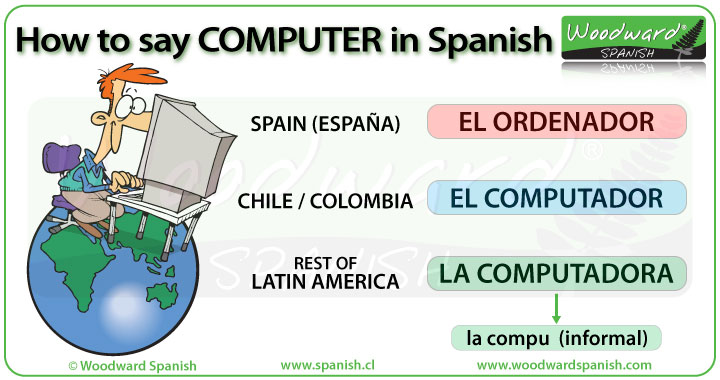How to say Computer in Spanish?
There are three different ways of saying computer in Spanish. It depends on where you are located.
- Spain: el ordenador
- Chile / Colombia: el computador
- Latin America: la computadora

Here is the official RAE explanation about the difference between computador and computadora according to their Diccionario panhispánico de dudas dictionary:
computador -ra. ‘Máquina electrónica capaz de realizar un tratamiento automático de la información y de resolver con gran rapidez problemas matemáticos y lógicos mediante programas informáticos’. Estas formas son las usadas mayoritariamente en el español de América, por influjo del inglés computer. Según las zonas, existen distintas preferencias: en la mayoría de los países de América se prefiere el femenino computadora, mientras que el masculino computador es de uso mayoritario en Chile y Colombia. En España se usa preferentemente el término ordenador, tomado del francés ordinateur.
You may also hear an informal shortened version used: la compu (especially among young people)
Occasionally you will here a computer called el PC o la PC (pronounced like Pe Ce) which comes from the English abbreviation PC (Personal Computer). Again a masculine or feminine article is used depending on the country.
Joke about the Spanish Gender for Computer
Here’s a joke about whether a computer is considered Masculine or Feminine in Spanish:
A Spanish teacher was explaining to her class that in Spanish, unlike English, nouns are designated as either masculine or feminine.
House for instance, is feminine: “la casa.”
Pencil, however, is masculine: “el lápiz.”
A student asked, “What gender is computer?”
Instead of giving the answer, the teacher divided the class into two groups, male and female, and asked them to decide for themselves whether
“computer” is a masculine noun or a feminine noun.
Each group was asked to give four reasons for its recommendation.
The men’s group decided that “computer” should definitely be of the feminine gender (“la computadora”), because:
- No one but their creator understands their internal logic;
- The native language they use to communicate with other computers is incomprehensible to everyone else;
- Even the smallest mistakes are stored in long term memory for possible later retrieval; and
- As soon as you make a commitment to one, you find yourself spending half your paycheck on accessories for it.
HOWEVER…
The women’s group concluded that computers should be Masculine (“el computador/el ordenador”), because:
- In order to do anything with them, you have to turn them on;
- They have a lot of data but still can’t think for themselves;
- They are supposed to help you solve problems, but half the time they ARE the problem; and
- As soon as you commit to one, you realize that if you had waited a little longer, you could have gotten a better model.
So, How do YOU say computer in Spanish?
